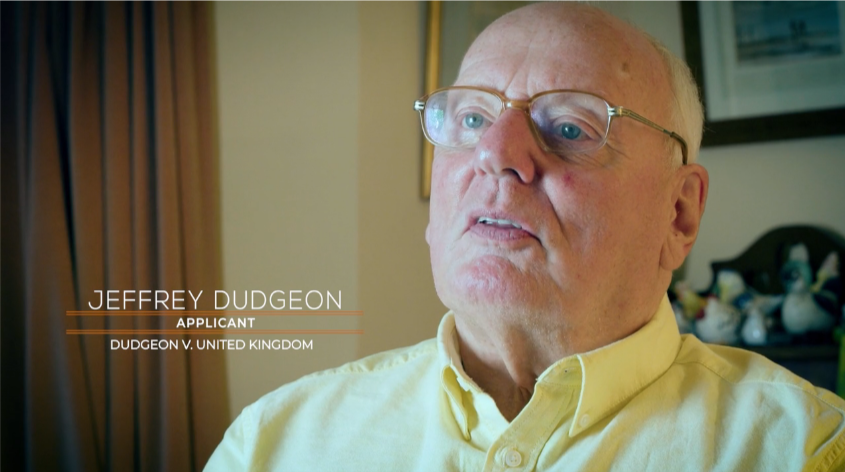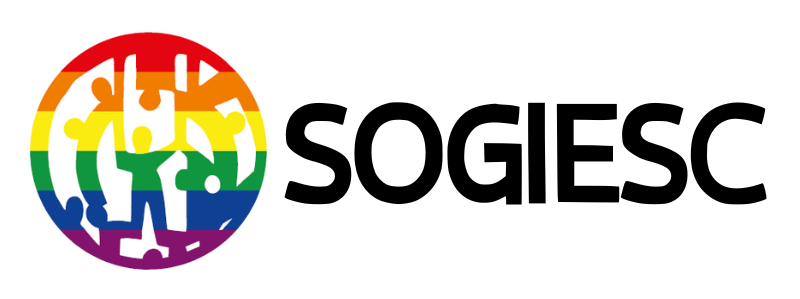The fight for LGBTI persons to enjoy their human rights has not been an easy one. 40 years ago today, Jeffrey Dudgeon found justice at the European Court of Human Rights, after facing police raids, intrusive interrogation about his sexual activities and the confiscation of his personal letters and diaries at a time when consensual same-sex relationships were still criminalised in Northern Ireland.
Back in 1981, the Strasbourg Court was the first international body to rule that laws criminalising sexual orientation violate human rights, namely the right to respect for private and family life. Its ground-breaking judgment led to the decriminalisation of homosexuality in Northern Ireland, the United Kingdom and Europe at large, recognising the human rights to millions of people.
To mark the 40th anniversary of the case, and celebrate the man behind it, we asked Jeffrey Dudgeon to share the first-hand account of his fight for justice in this short feature film.
The SOGI Unit is grateful for the participation of Jeffrey Dudgeon, Tim Eicke (the Judge in respect of the UK, European Court of Human Rights), Arpi Avetisyan (Head of Litigation, ILGA Europe) and LGBTI persons' rights advocates Brian Gilmore, Richard Kennedy and Douglas Sobey.
The case - Dudgeon v. the United Kingdom, 1981
In 1976, Jeffrey Dudgeon lodged an application with the European Commission of Human Rights complaining about the total prohibition of male homosexual acts in Northern Ireland, enforced through a law regulating all acts of buggery and gross indecency between males. This law provided the basis for police raids on the homes of gay men, who were subjected to extensive investigation and the threat of prosecution. Jeffrey had been questioned about his sexual activities by the police, who had also taken and kept diaries and personal correspondence from his home. In 1977, he was informed that a decision had been taken not to prosecute and the papers taken from him by the police were returned. Jeffrey complained that the law prohibiting male sexual acts had a “chilling or restraining effect on the free expression of his sexuality”.
On 22nd October 1981, the European Court of Human Rights upheld Jeffrey’s complaint that the criminalisation of homosexual acts between consenting adults in Northern Ireland amounted to an unjustified interference with his right to respect for private life under Article 8 of the European Convention on Human Rights.
Impact of the case in the United Kingdom, Europe and beyond
This judgment was a major breakthrough for LGBTI persons' human rights as it was the first case to be decided at the European Court of Human Rights in favour of LGBT persons' rights.
It led the UK Parliament to partially decriminalise sexual acts between men in Northern Ireland in 1982. But it also paved the way for the decriminalisation of homosexuality in Europe, as any law criminalising homosexual behaviour between consenting adults in Council of Europe member states would subsequently be considered a violation of Article 8 (right to respect for private life) under the human rights convention.
The case underpinned other judgments by the Strasbourg Court against states that enforced a total prohibition of homosexual acts (e.g.Norris v. Ireland, 1988 and Modinos v. Cyprus, 1993). However, it took until 2014 (Northern Cyprus) to achieve the complete decriminalisation of homosexual acts in all Council of Europe member states.
The Dudgeon case also shaped jurisprudence outside Europe – for example, in the United States, where it was cited in the US Supreme Court’s Lawrence v. Texas (2003) decision which found anti-sodomy laws in 14 states to be unconstitutional in the case.
Importance and relevance of the ECHR for the protection of LGBTI persons’ human rights
The Dudgeon judgement was the first, but not the only case where the European Court of Human Rights made major decisions positively impacting the human rights of LGBTI persons in Europe. In following years, the Court’s judgment triggered further important European legislative reforms in the field of Sexual Orientation, Gender Identity and/or Expression and Sex Characteristics (SOGIESC).
The Court has recognised the right of transgender persons to legal gender recognition without the requirement of sterilising surgery or treatment (A.P., Garçon and Nicot v. France, 2017); the right to legal recognition of same-sex relationships (Oliari and Others v. Italy, 2015); the right for same-sex couples to access civil unions when they are made available to different sex-couples (Vallianatos and Others v. Greece, 2013); non-discrimination with regard to second-parent adoption in a same sex-relationship (X. and Others v. Austria, 2013); the protection of freedom of assembly (Alekseyev v. Russia, 2010) and freedom of expression (Bayev and Others v. Russia, 2017), particularly for vulnerable groups including LGBTI persons; and the recognition of homophobic hate speech (Beizaras and Levickas v. Lithuania, 2020 and Lilliendahl v. Iceland, 2020) and homophobic hate crimes (Identoba and Others v. Georgia, 2015).
The Court considers the European Convention on Human Rights as a “living instrument”, which is “interpreted in the light of present-day conditions and of the ideas prevailing in a democratic society”. It has been a judicial pioneer in its interpretation of the Convention, requiring the recognition and protection of LGBTI persons over the last few decades and serving as a rich source of jurisprudential inspiration for other national and international courts.
There are areas in which the Court’s case-law is still evolving, such as on equal access to marriage, the elimination of SOGIESC-based discrimination in immigration and asylum, non-discrimination on the grounds of sex characteristics and gender identity, and the depathologisation of transgender identities.
The case-law of the Court was also enshrined in the Recommendation CM/Rec(2010)5 of the Council of Europe’s Committee of Ministers to member states on measures to combat discrimination on grounds of sexual orientation or gender identity, the world’s first international legal tool designed for this purpose. Its application ensures dignity and equality for LGBTI persons across Europe.
An appeal to the Court remains a powerful tool. In some instances, it is the only practical instrument to assert a claim to equality. LGBTI persons in Europe seeking redress against alleged violations of their rights and freedoms guaranteed by the Convention have a vested interest in accessing information about examples of successful litigation on the grounds of SOGIESC.
Upholding human rights, a duty of all member states
There is still a long way to go in the fight for equal rights. Upholding everyone’s human rights – including those of LGBTI people – is the duty of all states under the European Convention on Human Rights.
The Council of Europe will continue to provide its member states with the support required to protect LGBTI people, in law and practice.
We rely on the political leadership of our member states to reaffirm and strengthen their commitment to the human rights convention, to implement the Council of Europe’s recommendations and to lead by example in eliminating discrimination against LGBTI people.
Links
Judgment of the European Court of Human Rights in the case Dudgeon v. the United Kingdom 1981
Resolution of the Committee of Ministers in the case Dudgeon v. the United Kingdom, | DH (83) 13
Other resources
- Impact of the European Convention on Human Rights website case studies
- Decrmininalisation of homosexuality in Northern Ireland, UK and beyond (Dudgeon v. the United Kingdom, 1981)
- Legalisation of homosexuality in Ireland (Norris v. Ireland, 1988) and Decriminalisation of homosexuality in Cyprus (Modinos v. Cyprus, 1993)
- Legal battle leads to stronger transgender rights (B. v. France, 1992)
- Legal standards changed after gay father was denied custody of his child (Salgueiro da Silva Mouta v. Portugal, 1999)
- European Court of Human Rights factsheets on Homosexuality: criminal aspects, Sexual orientation issues and Gender identity
- Factsheet on the implementation of European Court of Human Rights judgments concerning LGBTI persons’ rights
- Recording of the ECHR conference ‘A 'Living Instrument' For Everyone: The Role of the European Convention on Human Rights in Advancing Equality for LGBTI Persons’ Part 1 - Part 2 (Programme - Info)




